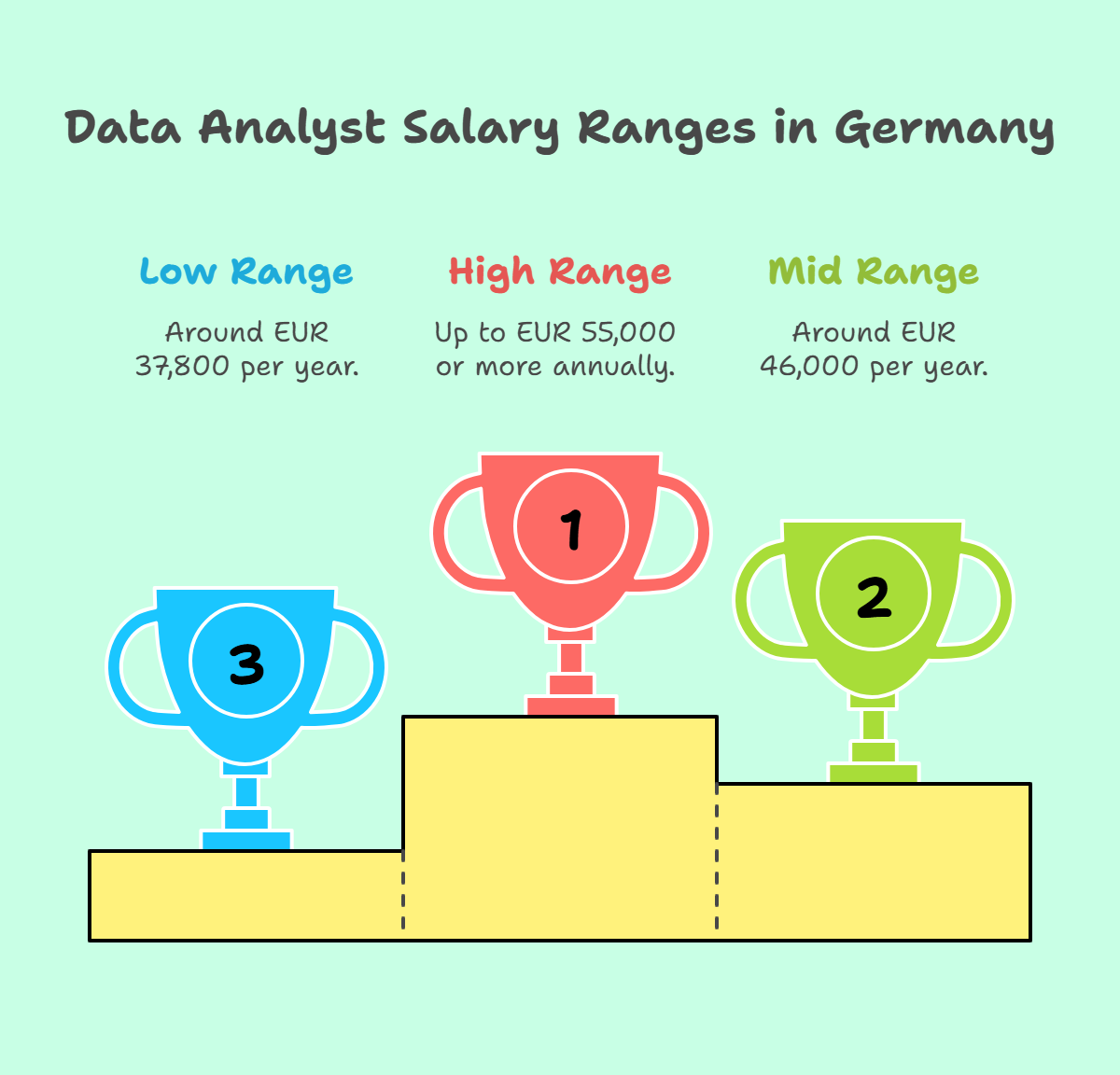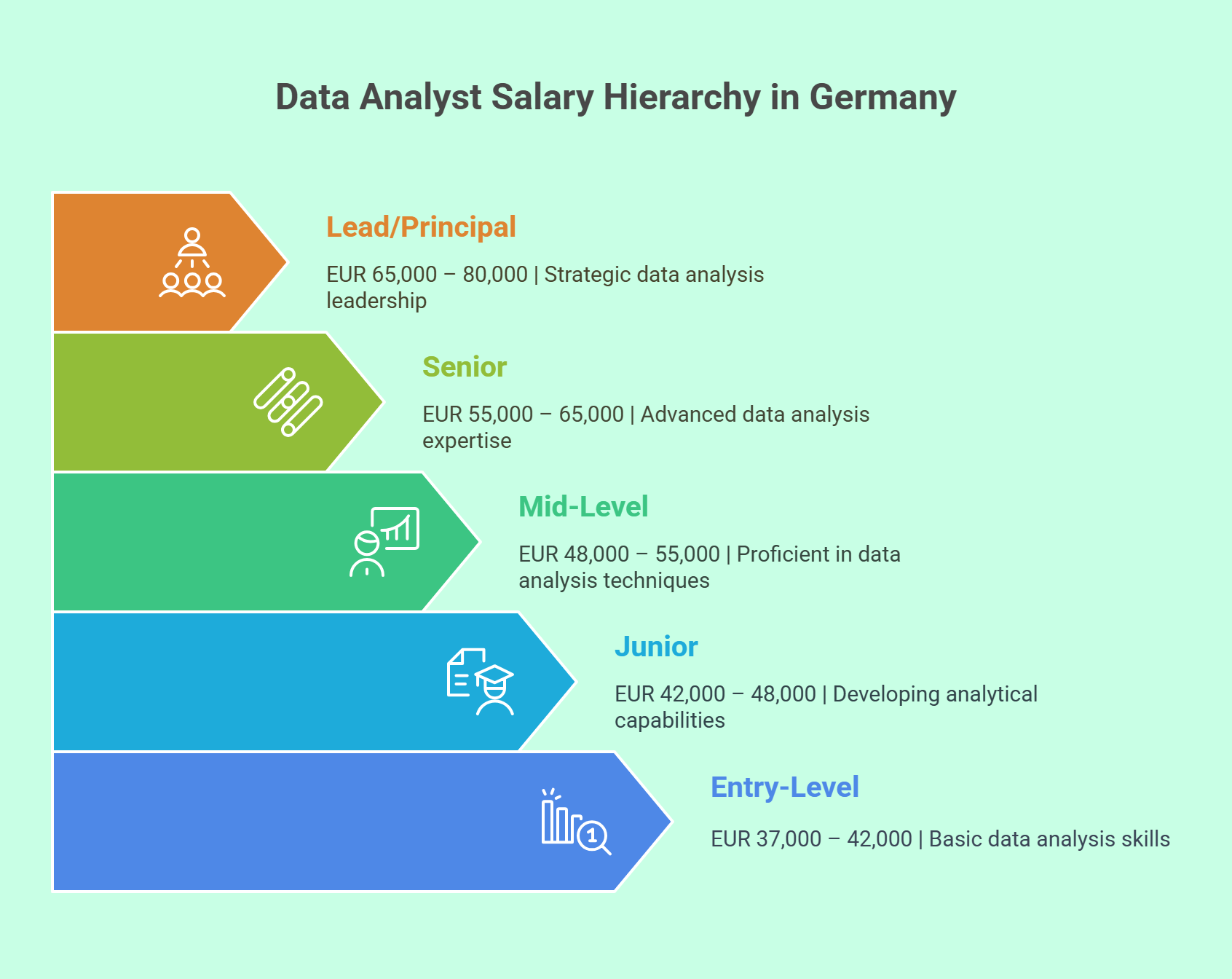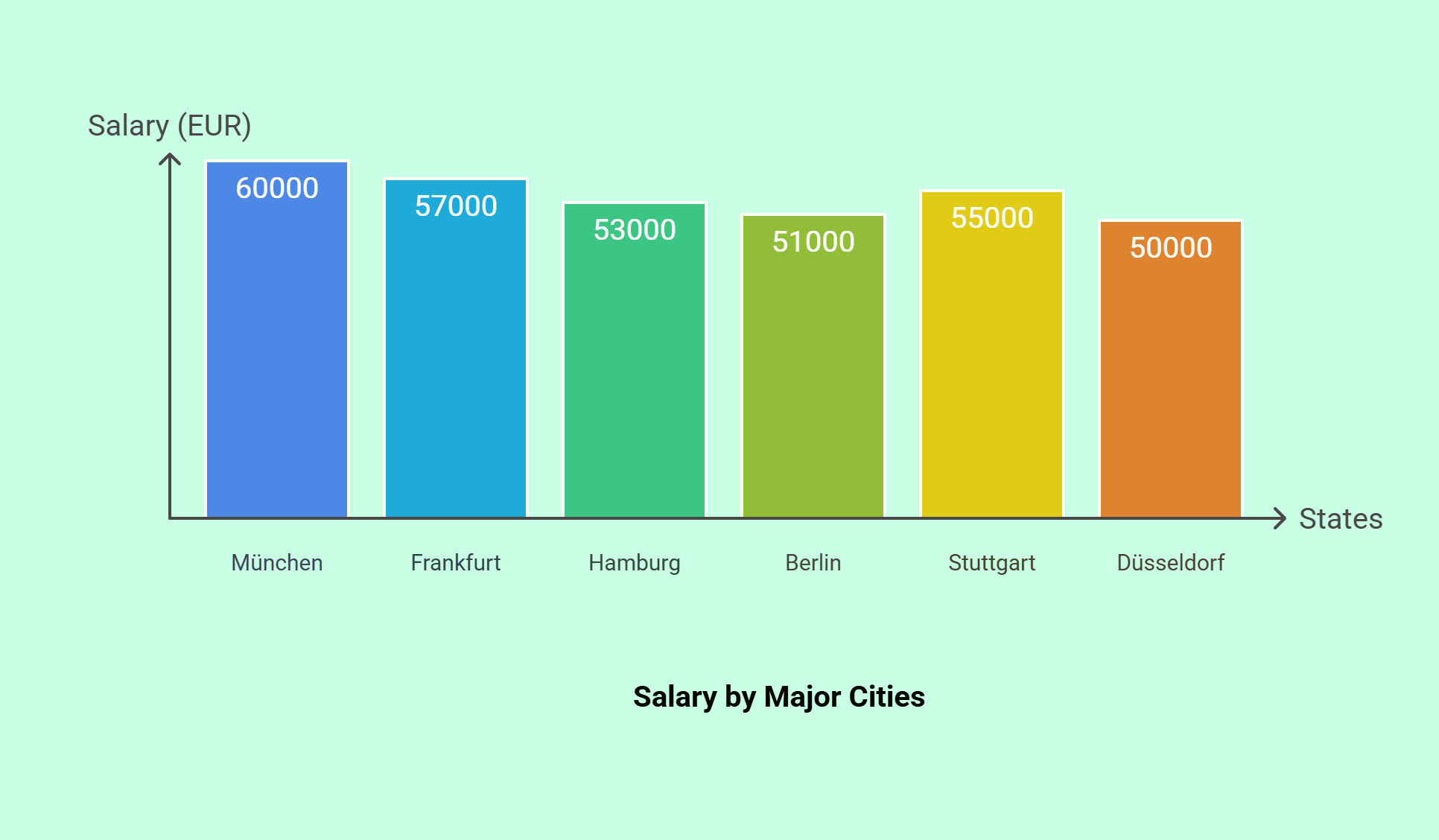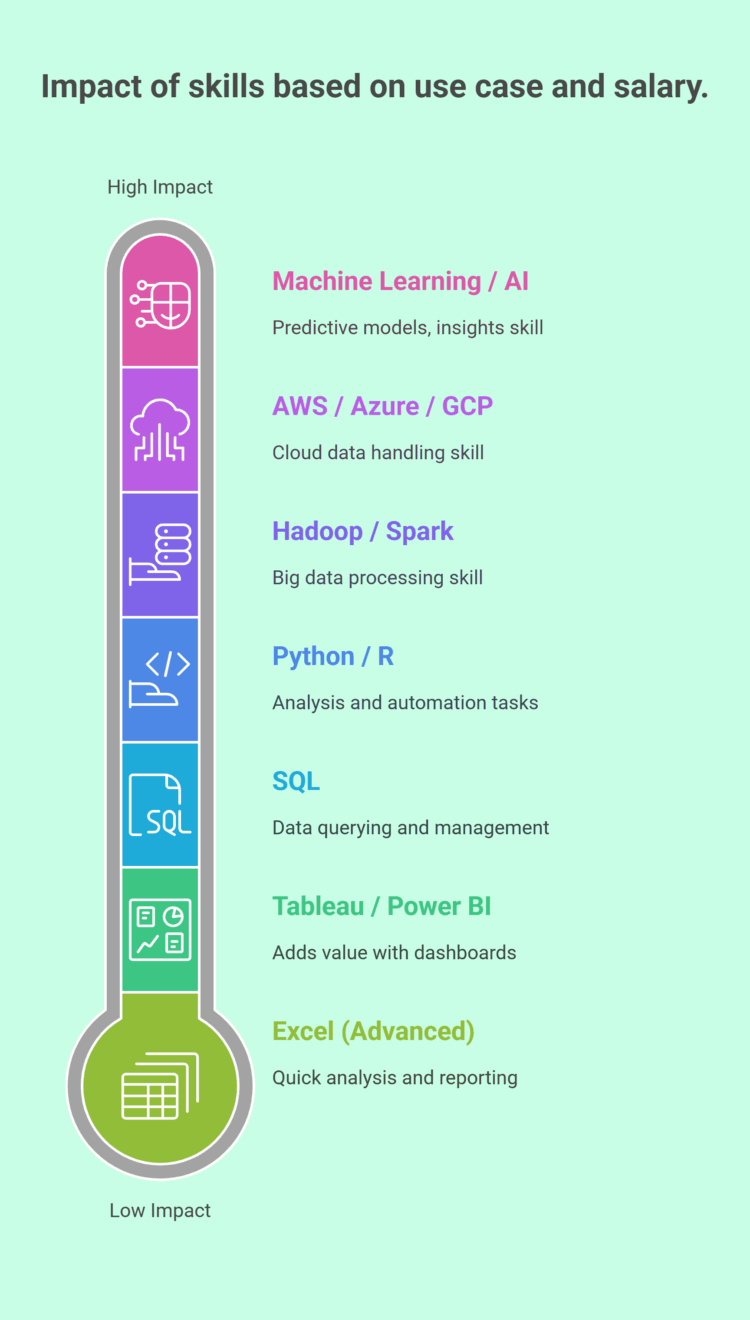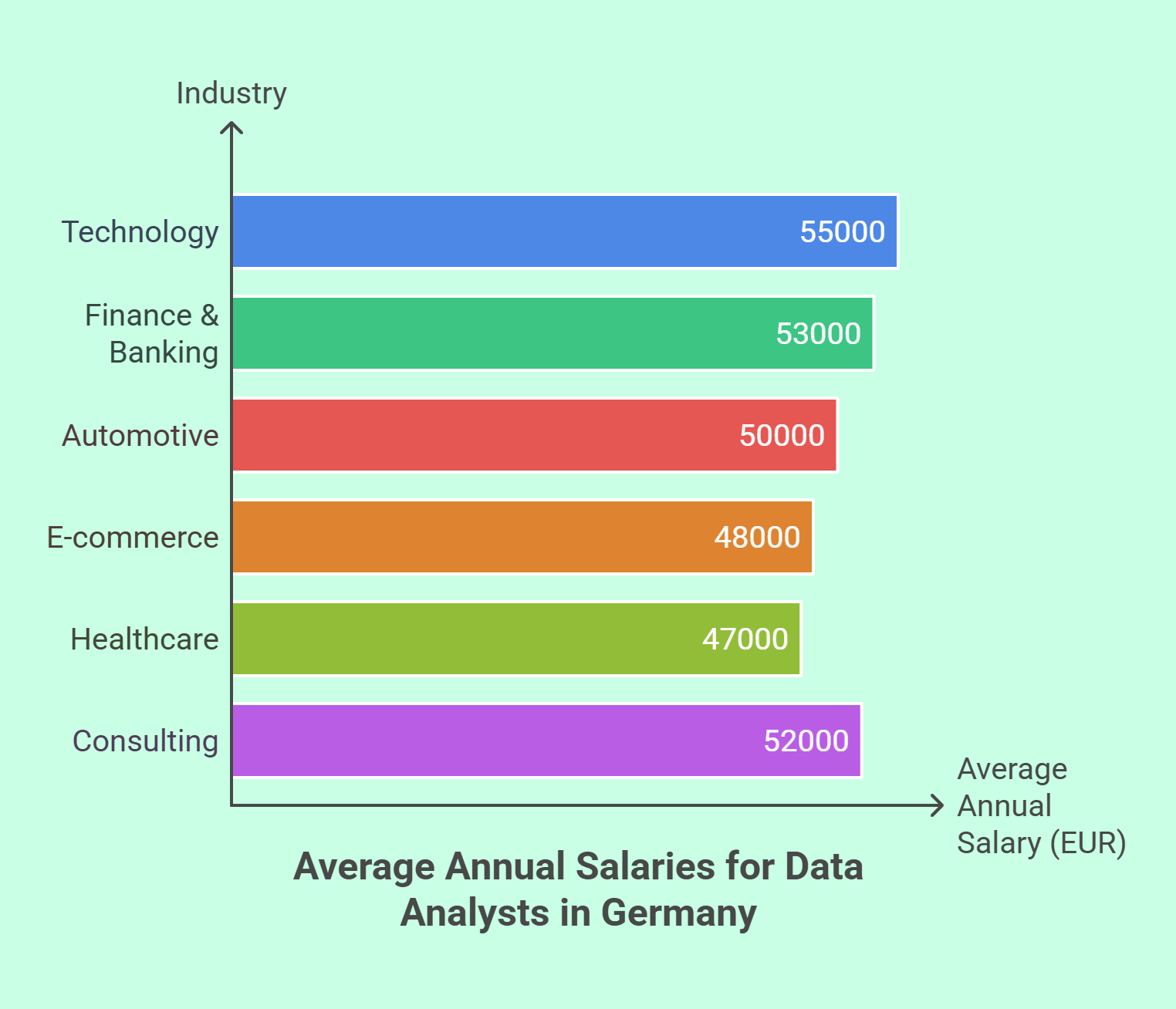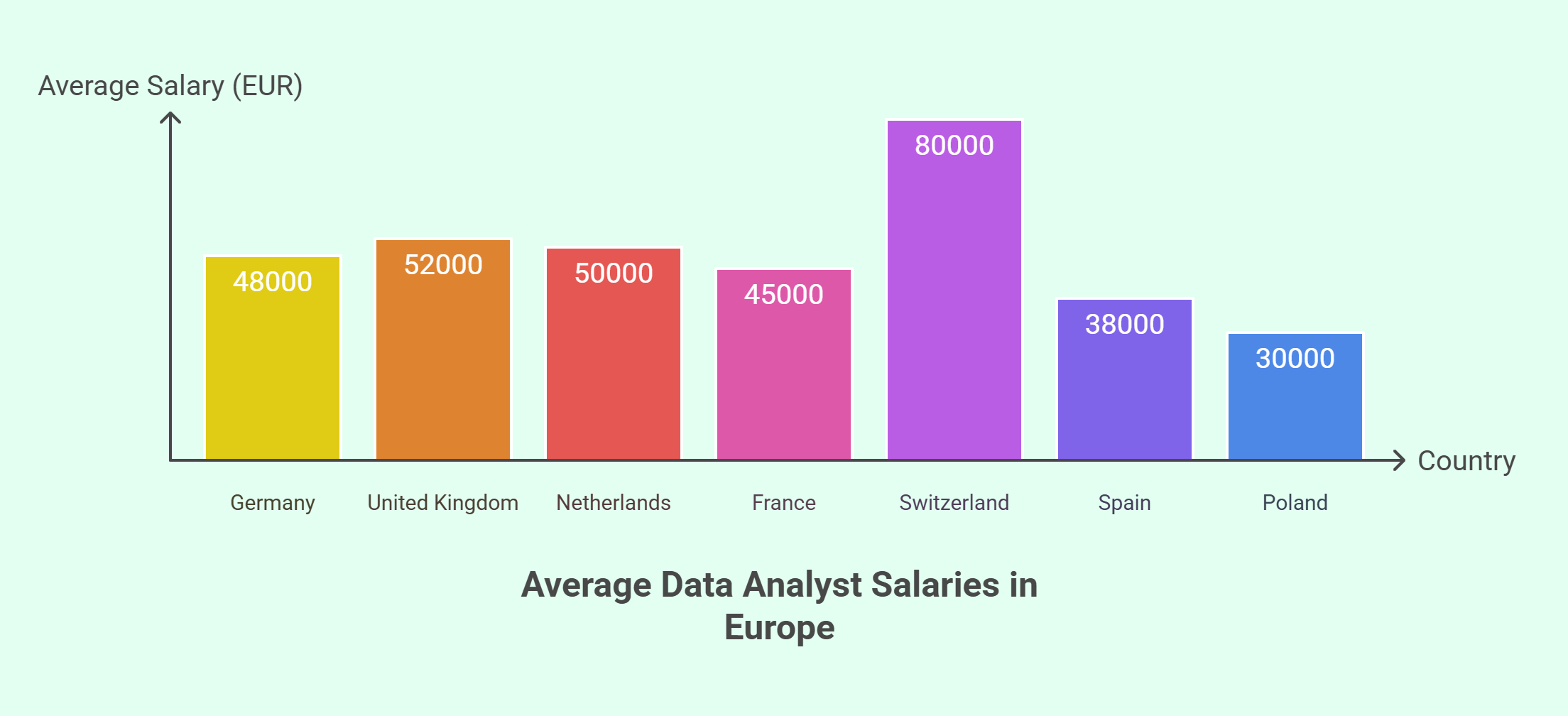Table of Contents
Data Analyst Salary in Germany is gaining attention. With rising demand, salaries are becoming more competitive. Germany is a hub for data-driven industries. Companies rely on analysts to guide key decisions. As a result, skilled analysts earn attractive pay. Salaries vary based on city and experience. Knowing the pay range helps with career planning. Job seekers want clear, updated salary insights. This article explains what analysts earn in 2025. Let’s break down salary trends and key factors.
Germany’s digital growth is fueling analytics careers. Businesses across sectors are hiring data professionals. From startups to banks, analysts are in demand. They turn raw data into business value. High demand means better pay and benefits. Many companies also offer relocation and bonuses. Germany welcomes both local and global talent. It’s a great place to grow your career. This guide helps you understand salaries and more.
Master the German Language with Entri App! Click Here for Free Trial Class!
Data Analyst Salary in Germany: Introduction
Data jobs are booming across Germany in 2025. Businesses rely on analysts to guide smart decisions. Demand is high across tech, finance, and healthcare. This makes data analytics a stable career option. Data Analyst Salary in Germany is highly competitive today. Most analysts earn between EUR 37,800 to 55,000 yearly. Top cities and skills can raise that number. Education, experience, and location all affect earnings. Salaries are also rising due to digital growth. This guide gives real numbers and clear insights.
Why This Guide Matters
-
The data industry in Germany is growing fast.
-
Many professionals want up-to-date salary information.
-
Knowing what to expect helps with career planning.
-
Salary varies by experience, city, and skillset.
-
Whether you’re starting out or switching roles, this helps.
This article aims to give you a complete, clear view of what data analysts earn in Germany in 2025—and what factors influence that pay.
Average Data Analyst Salary in Germany (2025 Overview)
1: How do you say "Good Morning" in German?
Data analysts in Germany earn competitive salaries in 2025. The pay reflects rising demand and growing job responsibilities. On average, analysts earn between EUR 37,800 to 55,000 yearly. Monthly pay falls between EUR 3,150 and 4,580. Actual salaries vary based on many personal and job factors.
Salary Ranges in 2025
Salaries differ due to role, experience, and job location. However, here’s a general idea of the yearly pay:
-
Low Range: Around EUR 37,800 per year
-
Mid Range: Around EUR 46,000 per year
-
High Range: Up to EUR 55,000 or more
Some professionals earn even more in specialized roles. Data leads and analysts with niche skills earn higher. Pay can also increase with project management experience.
Monthly Average Salary
Many professionals also want monthly salary estimates:
-
Lower monthly salary: EUR 3,150
-
Average monthly salary: EUR 3,800
-
Higher monthly salary: EUR 4,580
Bonuses and perks may be added to this amount. Relocation support and training budgets are also common extras.
Why Salaries Vary
Not every analyst earns the same amount. These factors strongly affect your pay level:
-
Experience level – Senior roles get higher offers
-
City of work – Munich and Frankfurt pay more
-
Industry – Tech and finance offer better pay
-
Skills – Strong tech skills bring better packages
-
Certifications – Verified skills help boost salary offers
Salaries in Germany are stable and rising steadily. Data analysts can expect good returns in the long run.
Free German A1 Mock Tests – Powered by AI!
Test your skills on our interactive platform. Get instant feedback from our AI to help you communicate better and track your progress. Start your free German mock test now.
Test Your German A1 for FreeData Analyst Salary by Experience Level in Germany
Experience plays a big role in how much you earn. As you gain skills, your salary grows with time. Companies pay more for advanced knowledge and responsibility.
Here’s a look at how salaries change by level.
Salary Table by Experience
| Experience Level | Average Annual Salary (EUR) |
|---|---|
| Entry-Level (0–2 years) | EUR 37,000 – 42,000 |
| Junior (1–2 years) | EUR 42,000 – 48,000 |
| Mid-Level (3–5 years) | EUR 48,000 – 55,000 |
| Senior (5+ years) | EUR 55,000 – 65,000 |
| Lead/Principal (10+ years) | EUR 65,000 – 80,000 |
Entry-Level (0–2 years)
Freshers start with basic tasks and limited tools. They usually work under senior analyst supervision.
-
Salary Range: EUR 37,000 – 42,000 per year
-
Common Roles: Reporting Assistant, Junior Data Analyst
-
Focus Areas: Excel, SQL, dashboards
Growth is steady with skill-building and learning new tools.
Junior Level (1–2 years)
With more experience, juniors take on deeper analysis tasks. They often handle independent projects with small teams.
-
Salary Range: EUR 42,000 – 48,000
-
Key Skills: Python, Tableau, Power BI
-
Expected Tasks: Data cleaning, basic modeling
At this stage, certifications help improve salary offers.
Mid-Level (3–5 years)
Mid-level analysts are trusted with business-critical work. They often lead data projects and train junior staff.
-
Salary Range: EUR 48,000 – 55,000
-
Core Tools: SQL, Python, dashboards
-
Added Skills: Business knowledge, stakeholder reporting
This is a good time to explore specialization paths.
Senior Level (5+ years)
Senior analysts take full control of large data teams. They work closely with managers and product heads.
-
Salary Range: EUR 55,000 – 65,000
-
Duties: Forecasting, insights, cross-functional projects
-
Soft Skills: Leadership, presentation, business strategy
Advanced certifications and domain knowledge increase pay here.
Lead/Principal Level (10+ years)
Leads shape the company’s entire data strategy. They build teams, design systems, and manage budgets.
-
Salary Range: EUR 65,000 – 80,000+
-
Focus Areas: Strategy, architecture, executive insights
-
Roles: Principal Analyst, Data Manager, Director
These roles come with bonuses and performance pay.
Experience has a big impact on your earnings. Each level brings more responsibility and new skills. Learning, upskilling, and smart career moves matter a lot. With time, salaries grow across all experience levels.
Master the German Language with Entri App! Click Here for Free Trial Class!
Data Analyst Salary by City in Germany (Highest Paying Locations)
City plays a major role in how much you earn. Some German cities offer higher salaries than others. This depends on industry presence and local demand. Living costs and business activity also affect salary levels.
Let’s explore the top-paying cities for data analysts.
Salary by Major Cities
Below is a table showing average annual salaries in 2025:
| City | Average Annual Salary (EUR) |
|---|---|
| Munich | EUR 55,000 – 65,000 |
| Frankfurt | EUR 52,000 – 62,000 |
| Hamburg | EUR 48,000 – 58,000 |
| Berlin | EUR 47,000 – 55,000 |
| Stuttgart | EUR 50,000 – 60,000 |
| Düsseldorf | EUR 46,000 – 54,000 |
Let’s look at each city in more detail.
Munich
Munich offers the highest average salaries in Germany. It’s a top hub for tech, finance, and research.
-
Average Salary: EUR 55,000 – 65,000
-
Key Industries: IT, Automotive, Insurance
-
Living Cost: Very high
Professionals earn more but spend more to live.
Frankfurt
Frankfurt is the financial capital of Germany. Many data analysts work in banks and consultancies.
-
Average Salary: EUR 52,000 – 62,000
-
Key Industries: Finance, Fintech, Legal Tech
-
Living Cost: High
Analysts with finance skills earn top pay here.
Hamburg
Hamburg has a growing digital and logistics sector. It’s a port city with rising tech investments.
-
Average Salary: EUR 48,000 – 58,000
-
Key Industries: Logistics, Media, E-commerce
-
Living Cost: Medium-high
Many startups and global firms hire analysts here.
Berlin
Berlin offers more jobs but lower average salaries. It’s known for its creative and startup culture.
-
Average Salary: EUR 47,000 – 55,000
-
Key Industries: Startups, Media, E-commerce
-
Living Cost: Medium
Good for new analysts seeking job variety.
Stuttgart
Stuttgart is strong in engineering and automotive data. It houses many global companies and research centers.
-
Average Salary: EUR 50,000 – 60,000
-
Key Industries: Automotive, Manufacturing, Tech
-
Living Cost: High
Experienced analysts are paid well in this city.
Düsseldorf
Düsseldorf has fewer jobs but still pays decently. It’s a good choice for mid-level professionals.
-
Average Salary: EUR 46,000 – 54,000
-
Key Industries: Consulting, Telecom, Healthcare
-
Living Cost: Medium
It’s a balanced option with stable job growth.
City affects salary due to demand, cost, and industry. Munich and Frankfurt lead in high-paying analyst jobs. Berlin offers more openings, especially for beginners. Choose a city based on skills, goals, and lifestyle.
Impact of Education and Qualifications on Data Analyst Salaries
Education strongly affects how much data analysts earn. Higher degrees often lead to better pay and roles. Certifications also boost credibility and improve job chances.
Let’s see how education and qualifications impact salaries.
Academic Degrees and Their Salary Impact
Most analysts have at least a bachelor’s degree. Higher education usually leads to higher salary brackets.
1. Bachelor’s Degree
-
Most common entry point in the industry
-
Fields: Statistics, Computer Science, Economics, Mathematics
-
Expected Salary: EUR 37,000 – 48,000 annually
-
Growth: Increases with certifications and work experience
2. Master’s Degree
-
Preferred for advanced or mid-level roles
-
Fields: Data Science, Business Analytics, AI, Engineering
-
Expected Salary: EUR 48,000 – 60,000 annually
-
Advantage: Better roles and faster career progression
3. Doctorate/PhD
-
Ideal for research, academia, and high-level analytics
-
Fields: Machine Learning, AI, Quantitative Analysis
-
Expected Salary: EUR 60,000 – 75,000+ annually
-
Best For: Research firms, labs, or AI leadership roles
Importance of Certifications
Certifications show that you have job-ready technical skills. They improve hiring chances and raise salary expectations.
Top Certifications That Boost Salary
-
SQL Certification
-
Shows database query knowledge
-
Common requirement in analyst job listings
-
-
Python / R Certification
-
Useful for data cleaning, stats, and automation
-
Highly preferred for mid and senior roles
-
-
Tableau / Power BI
-
For building interactive dashboards and reports
-
Proves your data visualization skills
-
-
Excel (Advanced Level)
-
Still used in many daily reporting tasks
-
Strong skill for junior and support roles
-
-
Google Data Analytics Certificate
-
Good for beginners entering the field
-
Covers basics in tools and business data
-
-
AWS / Azure / GCP Fundamentals
-
For analysts working with cloud platforms
-
Increasingly demanded in data engineering roles
-
Higher education leads to better job offers. Certifications help prove skills and improve hiring chances. Both degrees and verified skills matter in 2025. Keep learning to grow your salary in Germany.
Free German A1 Mock Tests – Powered by AI!
Test your skills on our interactive platform. Get instant feedback from our AI to help you communicate better and track your progress. Start your free German mock test now.
Test Your German A1 for FreeHighest Paying Data Analyst Skills in Germany
Skills decide how much you can earn in this field. The more in-demand your skills, the better your pay. Technical and soft skills both impact your salary growth. Let’s explore which skills pay the most in Germany.
Most In-Demand Technical Skills
Strong technical skills increase your job chances and salary. Below are the top-paying technical tools in 2025:
| Skill | Use Case | Salary Impact |
|---|---|---|
| SQL | Data querying and management | Essential for all roles |
| Python / R | Analysis and automation | High for mid/senior roles |
| Tableau / Power BI | Dashboards and reporting | Adds value in all levels |
| Excel (Advanced) | Quick analysis and reporting | Useful for junior roles |
| Hadoop / Spark | Big data processing | High in senior positions |
| AWS / Azure / GCP | Cloud data handling | Grows demand every year |
| Machine Learning / AI | Predictive models, insights | Top-tier skill in 2025 |
SQL – Foundation Skill
SQL is used in almost every analyst job. It’s needed to extract and manage large datasets.
-
Why It Pays: All companies rely on databases
-
Used For: Data cleaning, joins, summaries
-
Job Level: Entry to senior
Python / R – For Advanced Analysis
Python and R are key tools for deep analysis. They’re often required in mid and senior roles.
-
Why It Pays: Enables automation and modeling
-
Used For: Machine learning, stats, scripting
-
Job Level: Mid to expert
Tableau / Power BI – For Dashboards
These tools help make data easy to understand. Used by many businesses for reporting insights.
-
Why It Pays: Drives business decisions visually
-
Used For: Charts, reports, dashboards
-
Job Level: All levels
Excel (Advanced) – Basic but Useful
Excel is still common in small and large firms. Many daily reports are built using Excel.
-
Why It Pays: Quick, flexible tool
-
Used For: Calculations, pivot tables, graphs
-
Job Level: Entry to mid
Big Data Tools – Hadoop and Spark
These tools process massive volumes of raw data. They’re used by firms with huge data systems.
-
Why It Pays: Needed in complex data pipelines
-
Used For: Batch processing, large-scale tasks
-
Job Level: Senior roles only
Cloud Platforms – AWS, Azure, GCP
More companies now store data on the cloud. Cloud skills are key for modern data jobs.
-
Why It Pays: Cloud roles pay more in 2025
-
Used For: Storage, processing, automation
-
Job Level: Mid to senior
Machine Learning and AI
These are high-level tools for advanced predictions. Used in forecasting, product suggestions, and automation.
-
Why It Pays: Strong demand, fewer skilled people
-
Used For: Models, scoring, insights
-
Job Level: Senior and lead positions
Important Soft Skills
Soft skills also impact how much you’re paid. They support communication, teamwork, and leadership tasks.
Top Soft Skills:
-
Analytical Thinking: Solve complex problems easily
-
Communication: Explain insights to non-technical teams
-
Business Understanding: Align data with real goals
-
Problem Solving: Quickly fix data issues
-
Detail Focus: Avoid errors in large datasets
-
Willingness to Learn: Stay current with new tools
Your skills decide your role and salary range. Strong tools and soft skills together increase earnings. Keep learning to grow in the data field. The more skills you have, the more you’ll earn.
Data Analyst Salary by Industry in Germany
Industry type affects how much a data analyst earns. Some sectors pay more based on data complexity. Others offer steady jobs but lower average salaries.
Let’s explore the best-paying industries in Germany.
Why Industry Matters
- Each industry uses data in different ways.
- Data volume, sensitivity, and usage affect salary rates.
- Finance and tech often pay the highest salaries.
- Healthcare and retail offer good roles with growth.
Top Industries That Pay Well
Here are the top-paying industries for analysts in 2025:
| Industry | Average Annual Salary (EUR) | Salary Range (EUR) |
|---|---|---|
| Technology | EUR 55,000 | 48,000 – 70,000 |
| Finance & Banking | EUR 53,000 | 45,000 – 65,000 |
| Automotive | EUR 50,000 | 43,000 – 60,000 |
| E-commerce | EUR 48,000 | 40,000 – 58,000 |
| Healthcare | EUR 47,000 | 38,000 – 55,000 |
| Consulting | EUR 52,000 | 44,000 – 62,000 |
Tech firms rely heavily on data for growth. They pay high for skilled and creative analysts.
-
Why It Pays: Drives innovation and decision-making
-
Roles: Product, marketing, user analytics
-
Skills Needed: Python, SQL, cloud, dashboards
2. Finance and Banking
Banks use data to manage risk and customer behavior. Finance data is complex and highly regulated.
-
Why It Pays: High-risk, sensitive data handling
-
Roles: Risk analyst, fraud detection, reporting
-
Skills Needed: Excel, SQL, Python, finance models
3. Automotive Sector
Automotive firms use data for design and logistics. Germany has a strong car manufacturing base.
-
Why It Pays: Relies on precision and innovation
-
Roles: Product testing, supply chain, IoT analytics
-
Skills Needed: Python, sensors, machine data tools
4. E-commerce Industry
Online sellers use data to track customer trends. They pay well for marketing and sales analysts.
-
Why It Pays: Data drives all sales decisions
-
Roles: Customer behavior, pricing, performance reports
-
Skills Needed: SQL, Tableau, A/B testing
5. Healthcare and Pharma
Health data must be secure and accurate always. The industry pays for compliance and analysis work.
-
Why It Pays: High data sensitivity and growth
-
Roles: Patient records, hospital analytics, research
-
Skills Needed: Excel, R, medical domain knowledge
6. Consulting Firms
Consultants handle client data across many fields. They offer diverse projects and fast growth paths.
-
Why It Pays: Handles high-impact business questions
-
Roles: Strategy, insights, forecasting, BI
-
Skills Needed: Power BI, Excel, presentation skills
Industry type strongly affects salary and growth potential. Tech and finance offer the highest analyst pay. Other sectors also give stable, rewarding analyst roles. Choose your industry based on interest and skills.
Data Analyst Job Market Outlook in Germany (2025 and Beyond)
The job market for data analysts is growing fast. Germany needs skilled professionals across all major sectors.
Let’s explore the trends, drivers, and future opportunities.
1. Strong and Growing Demand
Data is now key for business decisions in Germany.
Companies rely on data to stay ahead in markets.
-
Hiring Trends
-
More roles posted every month in 2025
-
Demand highest in tech, banking, and healthcare
-
-
Job Types Growing
-
Data analysts
-
Business intelligence specialists
-
Machine learning analysts
-
2. Key Drivers Behind the Growth
Several strong forces push the demand even higher.
-
Digital Transformation
-
Most companies are going fully digital
-
Data skills needed for every department
-
-
Industry 4.0
-
German factories use smart systems and data
-
Data analysts needed in automotive and machines
-
-
Remote Work and Global Hiring
-
Remote roles allow global data job access
-
Companies hiring beyond local talent pools
-
3. Great Opportunities for International Talent
Germany welcomes skilled professionals from abroad in 2025. Analysts with strong skills have many chances to grow.
-
Why Germany Needs Global Talent
-
Local skill gap in data and AI
-
High demand not met by local graduates
-
-
Helpful Factors
-
English-speaking data roles growing
-
Tech firms offering relocation support
-
4. Key Challenges Ahead
Though jobs are rising, challenges still exist.
-
Skill Gaps
-
Many jobs need advanced tools and concepts
-
Learning new tools is now a must
-
-
Regulations Like GDPR
-
Data privacy laws affect data access
-
Analysts must handle data with full care
-
5. Future Outlook Beyond 2025
The outlook for data jobs remains highly positive. Growth is expected to continue for many years.
-
Projected Growth Rate
-
Over 25% growth by 2030
-
More jobs in AI and cloud analytics
-
-
Role Evolution
-
Analysts will shift to strategic business partners
-
Stronger focus on automation and decision support
-
The data analyst market is strong and expanding fast. Germany offers many roles for local and global talent. Stay updated, keep learning, and build your future here.
Master the German Language with Entri App! Click Here for Free Trial Class!
Data Analyst Salary in Germany vs. Other European Countries
Germany offers competitive salaries for skilled data analysts. Let’s compare with other European countries and key markets.
Why Compare Salaries Across Countries?
Knowing salary differences helps plan your career better.
It shows where demand and rewards are highest.
-
Helps with Relocation Decisions
-
Understand pay before moving abroad
-
Compare living costs and job roles
-
-
Know Market Value
-
Check where your skills are most valued
-
Choose the country that fits your goals
-
Average Annual Salary Comparison (2025 Estimates)
| Country | Average Salary (EUR) | Notes |
|---|---|---|
| Germany | €48,000 | Balanced pay and job security |
| United Kingdom | €52,000 | Higher pay, more competition |
| Netherlands | €50,000 | High pay, many tech startups |
| France | €45,000 | Slightly lower, good benefits |
| Switzerland | €80,000 | Very high, but costlier living |
| Spain | €38,000 | Lower pay, fewer tech firms |
| Poland | €30,000 | Fast-growing market, lower pay |
Germany offers fair pay with strong job stability. It balances salary, work culture, and career growth. Salaries may be higher elsewhere, but trade-offs exist. Choose a country that fits both pay and lifestyle.
Negotiating Your Data Analyst Salary in Germany: Tips for Success
Salary talks are a key part of job success. In Germany, preparation makes your offer much stronger. Know your value and approach negotiations with confidence.
Let’s explore useful tips for a better salary deal.
1. Research Thoroughly Before the Interview
Always know the average salary for your role. Check salary sites, job boards, and company reviews.
-
Know the Market
-
Use sites like Glassdoor and Payscale
-
Ask contacts about average offers
-
-
Check Role and Region
-
Salaries vary by city and industry
-
Compare similar jobs in your location
-
2. Highlight Your Skills and Experience
Show how your skills match the job needs. Use real examples and results to prove value.
-
Focus on Key Achievements
-
Show how you improved past processes
-
Mention data tools you have mastered
-
-
Mention Certifications and Projects
-
Talk about recent data courses
-
Include side projects or freelance work
-
3. Understand the Total Compensation Package
Salary is just one part of your total offer. Look at bonuses, perks, and relocation support too.
-
Common Additions
-
Health insurance and paid leave
-
Bonus pay and yearly salary reviews
-
-
Remote or Relocation Support
-
Ask about moving costs or remote setups
-
Some firms offer home office support
-
4. Be Confident but Stay Flexible
Speak with confidence during salary discussions. But also stay open to different offers.
-
Be Clear and Honest
-
Say what salary you expect
-
Share your reasons without pressure
-
-
Stay Professional
-
Avoid sounding too demanding
-
Focus on long-term job value
-
5. Time It Right
Don’t rush into salary talks too early. Wait until you have a clear job offer.
-
Right Moment Matters
-
Discuss pay after job interest is clear
-
Talk money once role and duties are known
-
6. Use Data to Support Your Request
Use facts to explain your salary expectation. Mention salary data, skills, and role fit.
-
Show Proof
-
“Based on Munich salaries, I expect €52,000”
-
“My experience fits the mid-level analyst role”
-
Good negotiation can boost your total salary offer. Stay calm, be prepared, and show your full value. Always think long-term and not just the base pay. With the right plan, you can earn your worth.
Data Analyst Salary in Germany: Conclusion
Data analyst roles are growing fast in Germany today. Salaries are competitive across cities, industries, and skill levels. Both beginners and experts have strong opportunities in 2025. With the right skills, growth is steady and rewarding. Education, location, and tools all impact your salary range. Learning tools like SQL and Python boosts your earning power. Certifications and experience also help you stand out more. Cities like Munich and Frankfurt offer higher average salaries. Germany welcomes both local and international data professionals now.
The future for data analysts looks bright and stable. Demand is strong across tech, finance, and healthcare sectors. Keeping your skills updated ensures continued job growth. Negotiating wisely also improves your final compensation package. Research, preparation, and confidence are key during job talks. Always review offers beyond just the base salary. Germany offers balance between pay, benefits, and work culture. Start building your data career with focus and planning. The journey is promising and full of growth.
| Related Links | |
| Data Analyst Career Path | Data Analyst Roadmap for Beginners: Step-by-Step Guide |
| Salary Guide for Germany in 2025: Profession-Wise Insights | Business Analyst Salary in Germany |
Free German A1 Mock Tests – Powered by AI!
Test your skills on our interactive platform. Get instant feedback from our AI to help you communicate better and track your progress. Start your free German mock test now.
Test Your German A1 for FreeFrequently Asked Questions
How much does a fresher data analyst earn in Germany?
A fresher with 0–2 years of experience can expect to earn between EUR 37,000 and EUR 42,000 annually, depending on city, company, and skills.
Are data analyst jobs in demand in Germany?
Yes, demand is very high due to digitalization and Industry 4.0. Most sectors need data professionals for decision-making and optimization.
What are the typical benefits for data analysts in Germany?
Typical benefits include health insurance, relocation support, flexible working hours, 30+ days of paid leave, and performance bonuses.
Do I need to speak German to get a data analyst job?
It helps, especially in non-tech firms. However, many companies in tech and startups hire English-speaking professionals for analyst roles.
Which city pays the highest for data analysts in Germany?
Munich is currently the highest-paying city, followed by Frankfurt, due to high living costs and presence of major tech and finance firms.
What's the difference between a Data Analyst and a Data Scientist salary in Germany?
Data Scientists generally earn EUR 10,000–20,000 more annually than Data Analysts, owing to their advanced modeling and machine learning expertise
What certifications boost a data analyst's salary in Germany?
Certifications in SQL, Python, Tableau, Google Analytics, Microsoft Power BI, and cloud platforms (AWS, Azure) help significantly increase salary potential.
Is it easy for international candidates to get data analyst jobs in Germany?
Yes, especially in tech hubs like Berlin and Munich. Many companies offer relocation support and hire English-speaking analysts with the right skills.
What is the work culture like for data analysts in Germany?
German companies value punctuality, precision, and independence. Work-life balance is prioritized, with clear communication and structured project timelines.
How can I increase my salary as a data analyst in Germany?
Gain experience, learn new tools, and earn certifications. Switching to higher-paying industries or cities also improves salary growth over time.



